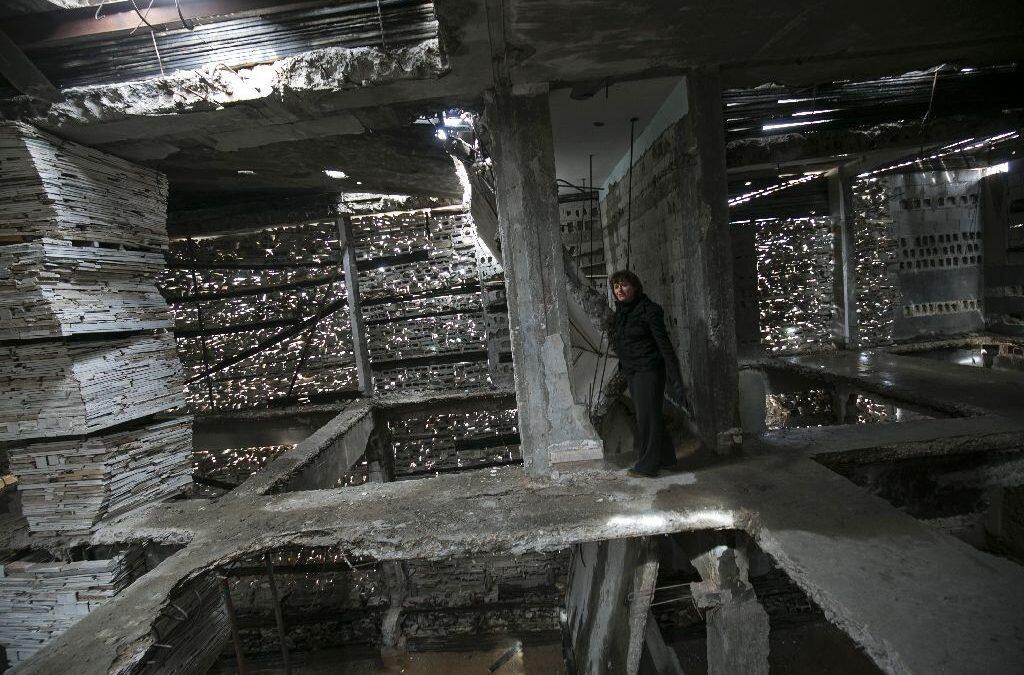Dutch artist Marjan Teeuwen walks past a column formed from rubble to show off her latest creation, a barren house in the Gaza Strip where doorless rooms face into bleak, empty space.
The ‘Shaath House’ in Khan Yunis in the south of the Palestinian territory was largely destroyed by an Israeli attack in the 2014 Gaza war but Teeuwen, 52, specialises in turning unwanted places into works of art.
Working with Palestinian engineers and artists and the Palestinian Red Crescent, she is “transforming a demolished house into a beautiful sculpture” which will serve briefly as a museum.
There is one major difference however between the Gaza house and her previous works, in the Netherlands, Russia and South Africa.
Teeuwen usually works in buildings that are due to be destroyed in a few months, turning them into temporary exhibits in what she describes as juxtaposition of the opposing forces of construction and destruction.
“(But) for the first time I started in a building which was destroyed already, which was destroyed by war,” she told AFP.
Perhaps Teeuwen’s most famous work in the Netherlands saw her transform four empty houses due for demolition into a minimalist space with tilted floors and caved-in walls.
But in Gaza, they had to start by rebuilding one of the walls destroyed during the war.
The team closed it with rows of bricks and breeze blocks stacked on top of each other but without cement, which is sparse in Gaza, leaving space for light to come through.
Inside the exhibition, which took Teeuwen three months, she has used rubble and chips of tiles from the war to construct a column which snakes upwards to the ceiling.
Floors have been twisted upwards or collapsed inwards, while some interior walls were removed completely. Others fall diagonally or are deliberately disjointed to create the feeling that “everything is on edge,” a written guide to the work said.
‘We love art and beauty’
More than 120,000 homes were partially or fully destroyed in the 50-day war in 2014, which led to the deaths of 2,251 Palestinians and 73 Israelis, according to the United Nations agency for Palestinians (UNRWA).
71,000 have been repaired, while 12,000 are in the process, UNRWA spokesman Chris Gunness said.
A further 57,000 are yet to be repaired or rebuilt.
Dressed in black, Teeuwen talked to her colleagues by a fire to keep warm in the winter air, despite the sun poking through holes in the roof.
“My message to the Palestinian people is visit this place and see the beauty,” she said.
Mohamed Abu Dagga, Teeuwen’s assistant, said he hoped the artwork would send a “message” about Gaza.
“Despite the blockade and all the wars the Palestinian people still love art and beauty and life,” he said.
Gaza has been under an Israeli blockade for a decade, while Egypt has also largely closed its border with the beleaguered Palestinian enclave — which is run by Islamists Hamas.
Mohammed al-Najjar, 40, from a nearby town, is still waiting for war-damaged his home to be rebuilt.
“I hope I find help to build a home like this,” he said.
After being shown to the public the Shaath House building will eventually be demolished, as the owner wants to construct a family home.
Source: AFP











